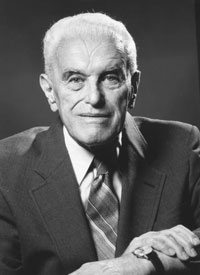
Back جون هارساني Arabic جون هارسانى ARZ Con Xarsani Azerbaijani جان هارسانی AZB Джон Харсаньі Byelorussian Джон Харшани Bulgarian John Harsanyi Catalan John Harsanyi Czech John Harsanyi Danish John Harsanyi German
John Harsanyi | |
|---|---|
 | |
| Born | János Károly Harsányi May 29, 1920 |
| Died | August 9, 2000 (aged 80) Berkeley, California, U.S. |
| Citizenship |
|
| Alma mater | University of Lyon University of Budapest University of Sydney Stanford University |
| Known for | Bayesian games Utilitarian ethics Equilibrium selection |
| Spouse | Anne Klauber |
| Awards | Nobel Memorial Prize in Economic Sciences (1994) John von Neumann Award |
| Scientific career | |
| Fields | Economics |
| Institutions | University of California, Berkeley Wayne State University Australian National University University of Queensland |
| Doctoral advisor | Kenneth Arrow |
John Charles Harsanyi (Hungarian: Harsányi János Károly; May 29, 1920 – August 9, 2000) was a Hungarian-American economist who spent most of his career at the University of California, Berkeley. He was the recipient of the Nobel Memorial Prize in Economic Sciences in 1994.
Harsanyi is best known for his contributions to the study of game theory and its application to economics, specifically for his developing the highly innovative analysis of games of incomplete information, so-called Bayesian games. He also made important contributions to the use of game theory and economic reasoning in political and moral philosophy (specifically utilitarian ethics[1]) as well as contributing to the study of equilibrium selection. For his work, he was a co-recipient along with John Nash and Reinhard Selten of the 1994 Nobel Memorial Prize in Economic Sciences.
He moved to the United States in 1956, and spent most of his life there. According to György Marx, he was one of The Martians.[2]
- ^ "Economics Faculty Directory". emlab.Berkeley.edu. Archived from the original on November 23, 2007. Retrieved December 2, 2017.
- ^ A marslakók legendája – György Marx